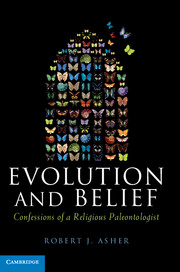Book contents
- Frontmatter
- Contents
- Acknowledgments
- Prologue
- One Science and Religion
- Two Evolution as a Science
- Three Characters and Common Descent
- Four The Fossil Record
- Five The Roots of Mammals
- Six A Brief History of Elephants
- Seven Whales are no Fluke
- Eight Creationism
- Nine DNA And The Tree pf Life
- Ten DNA and Information “Creation”
- Eleven Biology and Probability
- Twelve Evolution, Education, and Conclusions
- Notes
- Bibliography
- Index
Seven - Whales are no Fluke
Published online by Cambridge University Press: 05 March 2012
- Frontmatter
- Contents
- Acknowledgments
- Prologue
- One Science and Religion
- Two Evolution as a Science
- Three Characters and Common Descent
- Four The Fossil Record
- Five The Roots of Mammals
- Six A Brief History of Elephants
- Seven Whales are no Fluke
- Eight Creationism
- Nine DNA And The Tree pf Life
- Ten DNA and Information “Creation”
- Eleven Biology and Probability
- Twelve Evolution, Education, and Conclusions
- Notes
- Bibliography
- Index
Summary
Of all the groups of tetrapod vertebrates, none has done better at recolonizing the sea than mammals. And among the many mammals that make a living in water, none has done better than cetaceans, or whales. In this group are fully aquatic forms such as dolphins, porpoises, orcas, sperm whales, minke whales, blue whales, and humpbacks. The nature of their transition from terrestrial, to semiaquatic, to fully marine animals is very well documented in the fossil record. In the following pages, I wish to add only slightly to previous accounts of their origins from terrestrial, even-toed ungulates (including such animals as camels, pigs, deer, and hippos) by discussing the relevance to this origin of an extinct group of mammals called mesonychids. I will also discuss another cetacean evolutionary transition that has received somewhat less public attention than whale origins: the paleontological, genetic, and developmental links between toothed whales, such as dolphins and orcas, and baleen whales, such as minkes and humpbacks.
Cetacean Origins: Molecules and Mesonychids
From birth to death, modern whales do just about everything in the water. A marine habitat has profound implications for the anatomy of any animal, and whales show numerous specializations throughout their skeleton and soft tissues. To name a few, all living whales possess an unusually shaped, thick tympanic bone which (as discussed above in the section on early synapsids) forms the outer edge of the bony housing of the middle ear. Their sense of hearing is specialized to pick up sound via water rather than air, and they are good at using echolocation to navigate under water. In toothed whales, such as dolphins and orcas, this is helped by an organ called the melon, composed of fatty deposits contained in a bowl-like depression near the forehead. All living whales show bones of the face and rostrum that overlap one another (as opposed to touching end-to-end, as in most other mammals), a nasal aperture on top of the skull rather than in the front, an elongate vertebral column without a functional pelvic girdle or hindlimbs (although modern whales frequently retain the remnants of hip bones), and paddle-like forelimbs with many more finger bones than other mammals.
- Type
- Chapter
- Information
- Evolution and BeliefConfessions of a Religious Paleontologist, pp. 125 - 139Publisher: Cambridge University PressPrint publication year: 2012



